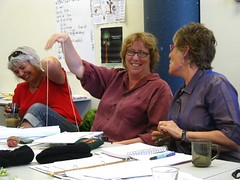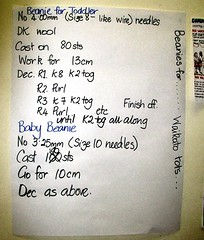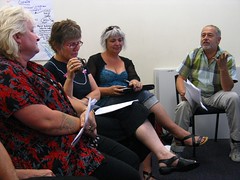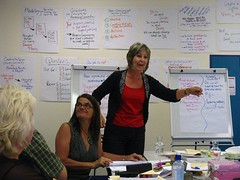
(Part 2: Community-Driven Tour 2010 in New Zealand. To read these posts from the beginning, head here.)
The Class
Consultant Class #8 in New Zealand. Ten brilliant minds, all part of UNITEC’s Graduate Diploma in Not-for-Profit Management, spent 5 days re-training their brains to focus on potential and possibility (vs. problem-solving). We learned from their brilliance, as we do in every class.
Here, though, we were also learning a new culture. We began and ended each day with a Maori blessing. We learned different expressions, different manners. We were reminded of our early days in Indian Country, where we had to get past our assumptions of sameness to find the uniqueness that might stymie us if we weren’t conscious of it.

New Zealand is known for sheep and wool, and so it was no surprise to find that just about everyone here knits. It was fun, though, to have almost the whole class knitting almost the whole time – beanies for babies living in poverty. On the wall next to the flip chart sheets about vision and values were the knitting instructions for infant vs. toddler hats.

As happens in every class, the nurturing environment took over from Day 1. People felt safe to explore together, to not have to be the expert, to be vulnerable. As seasoned consultants, it is rare to find a place where we can experiment, where we can feel safe to try something we haven’t done before while being honest about how insecure we feel “building the plane while we’re flying it.” This is one of the blessings in each class we teach – the space for that vulnerable exploration. Not feeling the need to be the expert, our classes allow consultants to test things out, to confess their own concerns, their fears. When you live by your wits and your wisdom, having such a safe place is a gift more precious than gold.

And wow did this group practice. There was barely a day when anyone sat out the opportunity to practice new approaches to facilitating social change. They imagined upcoming planning sessions with foundations and international development organizations and huge faith-based programs. They listed the assets and mapped the degrees of separation of small grassroots disability groups and national healthcare facilities. At every turn we were in another community, often in another country.

Then they focused inward, reconsidering the content in some of UNITEC’s core classes, working through sticky issues, finding new ways to think about everything. In each case, the setting allowed for exploration and discovery. In each case, things clicked into place, allowing participants to pre-think together. It was a gift to be part of their learning process, and to simultaneously learn from their wisdom.

At the end of the last day of class, our students returned the gift and then some, handing us a basket filled with goodies. A book about the poet Rainer Rilke (into which I have been diving every night before bed). A set of coasters shaped to represent the Koru – the unfurling fern frond that is a common cultural symbol around the country, representing rebirth and possibility.

While we shouldn’t have been surprised, we were indeed surprised to find a newly-knitted hat for Dimitri and a newly-knitted cowl for me. It turns out we were among the “babies” they had been knitting for all week long.
And then they sang for us.
Aly had rushed home during lunch to grab her ukelele, and together the group sang to honor us with a traditional Maori blessing, Te Aroha. They then went beyond that tradition, to sing something from our own home – a tune so thoughtfully chosen to represent not just America, but specifically our home in the American West. Yes, the group we had taught all week about busting out of traditional ways of thinking – that group sang us Don’t Fence Me In.
Auckland
All this happened in Auckland, the largest city in New Zealand. Our hotel, the Waldorf St. Martin (actually a “serviced apartment” that was high on amazing facilities and low-to-the-point-of-surly on service…) was a 5-minute walk from the classroom. Ok, it was 5 minutes downhill to the classroom, and about 15 minutes back up the hill.
The hills are just one of the many facts of life in Auckland. Another is the fact that women are almost more into shoes in Auckland than in NYC. It is one thing to consider walking the flat pavement of NY in gorgeous shoes; it is quite another to see women walking the hills of Auckland in fabulously sexy 4″ heels. But I digress…

Our apartment was on the 17th floor, and we took every opportunity to sit on the balcony and shoot – the full moon, the changing colors of the light on the Auckland Museum, the bay, the clouds, the sunrise.
The coffee shop next door – Sierra Cafe – became our lifeline. I confess to filling a buy-10-get-1-free card in the time we were there. New Zealanders drink their coffee strong – espresso is the rule, not the exception. Any attempts to wean myself off caffeine in 2010 went out the window by Day 2. At Sierra Cafe, though, great coffee was matched by great pastries. I hold their white brownie and their cranberry / white chocolate muffin almost entirely responsible for the 6 pounds I gained on this trip.

Each night after an exhilarating and yet exhausting day of teaching, Dimitri and I would walk up and down the hills in search of dinner. One cannot find better food anywhere, and tons of it. We ate Thai and Korean and Chinese. We ate wonderful French crepes. We even ate at the Brooklyn Bar – breakfast served any time.
Our class was over on Sunday night. By Wednesday, we had moved to the Waipuna Resort, 15 minutes outside downtown Auckland, where thanks to the persistence of Garth, Margy-Jean and Aly, I was to keynote the National Not-for-Profit Conference.
To read the next post in this series – Learning from Maori Culture – click here.
Photo Credits: HG & DP (fern is from a postcard)
